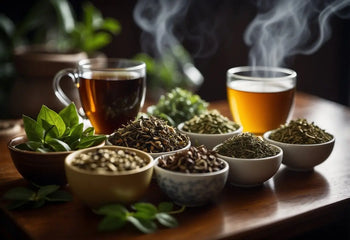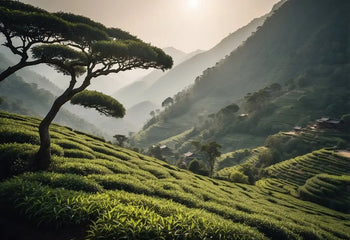Types of Tea
True teas all come from the Camellia sinensis plant and include five main types. Each type uses unique processing methods that impact flavor, aroma, and caffeine levels. Black Tea Black tea undergoes full oxidation, giving it a robust flavor and dark color. It's known for its bold and strong taste, making it popular as a breakfast tea. Common black teas include: Assam Darjeeling Earl Grey You can drink black tea on its own or with milk and sugar. It also contains higher caffeine levels compared to other true teas. Green Tea Green tea is lightly oxidized, preserving more of its...
What Is Raw Puerh
Raw Puerh tea, also known as "sheng" Puerh, has a rich history and a distinct processing method that contributes to its unique flavor and aging potential. Definition and Origin Raw Puerh originates from Yunnan Province in China, renowned for its ancient tea trees. This tea is traditionally compressed into cakes or bricks. Unlike other teas, Raw Puerh is minimally processed, retaining its natural enzymes which induce fermentation over time. The aging process enhances the tea's flavor, shifting it from a fresh, astringent taste to a more mellow and complex profile. The best Raw Puerh can age for decades, developing layers...
How to Make Pu Erh Tea Taste Better
Pu-erh tea has a rich history and comes in various types, each with unique characteristics. It also offers several health benefits that contribute to its popularity. History of Pu-erh Tea Pu-erh tea originates from Yunnan Province in China. The tea's history dates back over a thousand years during the Tang Dynasty. Originally, it was traded along the ancient Tea Horse Road and valued for its preservation qualities and flavor development over time. The art of making Pu-erh tea involves specific fermentation and aging processes, which vary based on traditional methods and modern innovations. Types of Pu-erh Tea There are two...
What to Serve with Pu Erh Tea
Pairing Basics for Pu-erh Tea Cheese: Pu-erh tea pairs wonderfully with cheese. Opt for aged cheeses like Gouda or Parmesan. Nuts: The earthy flavors of this tea complement nuts. Try almonds, walnuts, or pecans. Fruits: Fresh fruits such as apples, pears, and citrus enhance the tea's complex profile. Chocolate: Dark chocolate with a high cocoa content balances the tea's richness. Meat: Smoky meats like duck or beef match well. You can also serve cured meats. Sweets: Consider serving mooncakes, date cakes, or sesame balls for a traditional touch. Spicy Dishes: Spicy foods like Sichuan cuisine harmonize with the tea's earthy...
Recent articles






